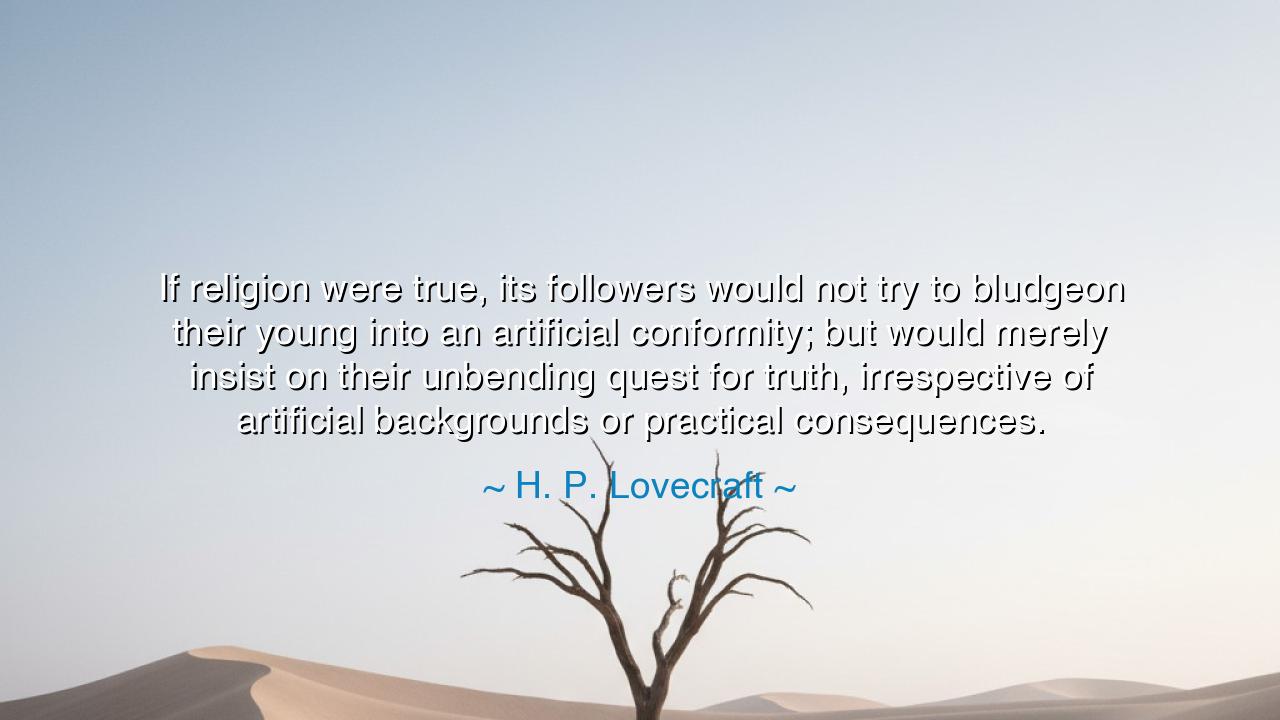
If religion were true, its followers would not try to bludgeon
If religion were true, its followers would not try to bludgeon their young into an artificial conformity; but would merely insist on their unbending quest for truth, irrespective of artificial backgrounds or practical consequences.






"If religion were true, its followers would not try to bludgeon their young into an artificial conformity; but would merely insist on their unbending quest for truth, irrespective of artificial backgrounds or practical consequences." These words by H. P. Lovecraft delve deep into the heart of what true belief should represent—a genuine, unyielding quest for truth that is free from the constraints of societal pressures and dogmatic conformity. Lovecraft, a master of cosmic horror, often explored the limits of human understanding and the vastness of the unknown. His critique of religion is not an attack on faith itself, but on the manipulative structures that, in his view, often distort and restrict the search for truth. He suggests that if religion were truly a guide to the divine, it would inspire followers to seek the truth with integrity and honesty, rather than impose a rigid, often artificial, set of beliefs onto the minds of the young.
This idea is deeply rooted in the ancient philosophy of Socrates, who believed that truth was not something to be handed down as a fixed set of answers, but rather something to be discovered through critical questioning and reflection. Socrates famously stated that "the unexamined life is not worth living," which encapsulated his belief that only through individual inquiry could one approach the truth. Socrates taught that the search for knowledge should not be bound by the expectations of society or the teachings of any particular group. Instead, the individual must be free to question, explore, and discover for themselves, no matter the consequences. In this light, Lovecraft’s critique of religion echoes Socratic thought: true faith would encourage a quest for truth, not the imposition of preconceived answers.
Consider the story of Galileo Galilei, whose pursuit of scientific truth in the face of the Catholic Church's authority embodies the tension between dogma and the search for truth. Galileo, through his observations of the night sky, uncovered evidence that contradicted the Church’s geocentric view of the universe. Rather than blindly conforming to the established teachings, Galileo dared to seek the truth, no matter the personal cost. He was eventually condemned by the Church, but his legacy endures as a symbol of the conflict between the freedom of thought and the forces of conformity. In this instance, the church’s doctrine sought to "bludgeon" the pursuit of knowledge into an artificial conformity, while Galileo’s actions reflected Lovecraft’s view that a true belief in truth should be unbending.
Similarly, the life of Socrates himself provides a poignant example of this conflict. Socrates was sentenced to death for corrupting the youth of Athens and questioning the established norms of society, much of which was intertwined with religious beliefs. Socrates did not fear the repression of his ideas or the imposition of conformity; rather, he continued to question and seek the truth. His steadfast refusal to accept the status quo, even in the face of death, mirrors Lovecraft’s belief that a true religion would promote the freedom to pursue truth, unencumbered by rigid expectations or societal pressures. Socrates, like Galileo, shows us that true intellectual and spiritual growth comes not from the imposition of doctrines but from a personal, unyielding search for truth.
In modern history, the civil rights movement led by Martin Luther King Jr. can be viewed as another example of how true faith and social change can transcend artificial conformity. King, a deeply religious man, did not conform to the societal norms of racial segregation and injustice, even when they were reinforced by the dominant religious and political institutions of the time. His Christian faith was rooted in the pursuit of truth and justice, not in adhering to a set of traditions that perpetuated oppression. King’s unbending commitment to the truth of equality and nonviolence, rooted in his religion, pushed him to challenge the artificial structures that sought to maintain separation and injustice. His work shows that true religion can serve as a powerful tool for seeking justice and truth, but only when it frees itself from the chains of conformity and encourages the individual to act in pursuit of what is right, regardless of societal expectations.
The lesson Lovecraft offers is one of intellectual freedom and the integrity of the search for truth. To him, religion should not be an instrument of oppression, but a catalyst for liberation, allowing individuals to seek truth freely and honestly. Faith should empower people to challenge falsehoods, to question established norms, and to stand for what is just, even in the face of societal resistance. Religion, at its highest and purest, should encourage a spirit of inquiry, freedom, and authenticity, not the blind acceptance of doctrines that limit growth and understanding.
In practical terms, we can embrace this wisdom by ensuring that our own beliefs—whether religious, philosophical, or moral—are rooted in genuine inquiry and personal reflection. We must not let tradition or dogma dictate our search for the truth, but rather approach the world with an open mind and heart, ready to question, learn, and grow. Whether in our spiritual journeys or our daily lives, we should strive to embrace a belief system that empowers us to challenge conformity, to seek what is just, and to approach the world with a sense of freedom and integrity. By doing so, we align ourselves with the unyielding quest for truth that Lovecraft, Socrates, and King exemplify, ensuring that our lives and beliefs remain authentic, free, and full of purpose.






AAdministratorAdministrator
Welcome, honored guests. Please leave a comment, we will respond soon